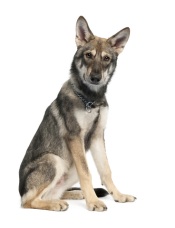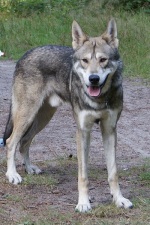What is a Wolf Dog?
A wolf dog refers to a dog that has a pure wolf ancestor. The wolf generally appears in the line within the last 5 generations.
I was a bit surprised when on an outing to the local dog friendly mall, a woman looked at my German Shepherd and loudly exclaimed, "What is that... a WOLF?"
Then I stopped to think that there are several dog breeds that appear wolf-like:
- Akita
- Alaskan Malamute*
- Belgian Shepherd (Groenendael, Malinois, Tervuren)
- German Shepherd*
- Northern Inuit Dog
- Siberian Husky*
- Tamaskan
- Utonagan
*Most wolfdogs seen today are mixed with these dog breeds.

Wolf Dog Evolution
There is archeological evidence that suggests the first domesticated wolf or dog existed between 10-14 thousand years ago.
Over time, domesticated dogs have become less like wolves.
Wolf vs Dog
Dogs are slower than wolves in development, both physical and behavioral.
Wolfdog puppies open their eyes earlier, at 10 days versus 14 days for dogs. They reach the developmental milestones of walking, carrying objects in their mouth and play fighting later than wolves. The socialization period in dogs lasts much longer.
The skin of dogs is thicker than wolves. They share the same number of teeth, but dogs' teeth are smaller. It is also interesting to note that a dog's head is approximately 20 percent smaller than a wolf's.
Wolves are better at escaping enclosures. They also appear to pay more attention to physical objects and handle them more capably than dogs.
Research has shown that wolves tend to be better at solving physical puzzles. But, dogs have better people skills.
Wolf Dog Hybrid?
Many people use the term "wolf hybrid" to describe wolfdogs. This is a common misnomer. A hybrid actually refers to the offspring produced by two different species. In 1993, taxonomists reclassified the dog. Now, every domestic dog (canis lupus familiaris) is actually a domestic variation of the gray wolf (canis lupus).
Wolf Dog Adoption
Considering a wolfdog?
Please do not take this decision lightly. And complete your research first. Wolf dogs are special needs animals that may or may not be legal in your area.
Check state regulations before you do anything else. Even if your state allows them, make sure you check the county or township. Many areas do not allow them as there is no approved vaccine specifically for the wolfdog.
 Wolf dogs, like pure wolves are not considered one of the agressive dog breeds. They are timid by nature. While they may look imposing, they are more likely to back down than face an intruder. Wolf dogs, like pure wolves are not considered one of the agressive dog breeds. They are timid by nature. While they may look imposing, they are more likely to back down than face an intruder.
Unless they were raised with small animals, they will probably not accept them. And their high prey drive will make them chase anything small and fast.
They are not wild animals and depend on humans for food and protection. It would be a mistake to think that they would do fine left on their own. An abandoned wolfdog is subject to confusion, fear and loneliness, and will most likely die of disease, starvation, attacks from other animals, a trap or a bullet.
Learn all there is to know about owning a wolfdog from sites such as Wolf Dunn.
Talk to other owners. The Wolfdogz group on Yahoo is a great resource.
Wolf Dog Rescue
Consider a wolfdog rescue. Many people adopt not realizing the challenges that come with owning one. And they end up in rescue through no fault of their own.
Wolfdog Rescue Resources, Inc.
East Coast
5 Raines Court
Stafford, VA 22556
(540) 720-8588
West Coast
(714) 673-3729
Or support a wolfdog sanctuary:
Full Moon Farm
P.O. Box 1548
Black Mountain, NC 28711-1548
(828) 669-1818
Night Song Refuge
377 High Wood Ln
Zirconia, NC 28790
(828) 693-0010
Wolf Mountain Sanctuary
Post Office Box 385
Lucerne Valley, CA 92356
760-248-7818

The information and
products recommended by german-shepherd-lore.com are not intended to
take the place of expert veterinarian care. Please consult with your
vet and ask about using a natural and alternative approach for the
healthcare and treatment of your pet. Find a holistic vet.
|

